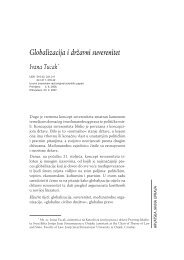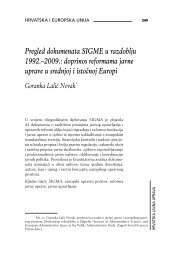Public Administration Reform: A Few Remarks on Libyan Case - IJU
Public Administration Reform: A Few Remarks on Libyan Case - IJU
Public Administration Reform: A Few Remarks on Libyan Case - IJU
Create successful ePaper yourself
Turn your PDF publications into a flip-book with our unique Google optimized e-Paper software.
HRVATSKA JAVNA UPRAVA<br />
428<br />
Norbert Wimmer: <str<strong>on</strong>g>Public</str<strong>on</strong>g> <str<strong>on</strong>g>Administrati<strong>on</strong></str<strong>on</strong>g> <str<strong>on</strong>g>Reform</str<strong>on</strong>g>: A <str<strong>on</strong>g>Few</str<strong>on</strong>g> <str<strong>on</strong>g>Remarks</str<strong>on</strong>g> <strong>on</strong> <strong>Libyan</strong> <strong>Case</strong><br />
HRVATSKA JAVNA UPRAVA, god. 9. (2009.), br. 2., str. 421–442<br />
platforms of Jamahiriya, which have the same significance for administrative<br />
leadership as the civil societies. Thus, it may be of some interest to<br />
describe the attributes as well as instituti<strong>on</strong>al and pers<strong>on</strong>al instruments of<br />
good governance.<br />
IV. New instituti<strong>on</strong>al approaches to good<br />
governance: the New <str<strong>on</strong>g>Public</str<strong>on</strong>g> Management<br />
1. The philosophy and elements of the New <str<strong>on</strong>g>Public</str<strong>on</strong>g><br />
Management<br />
The New <str<strong>on</strong>g>Public</str<strong>on</strong>g> Management is not an isolated reform issue – it is an<br />
element of the philosophy and politics of the »lean state«, which means<br />
the transformati<strong>on</strong> of the welfare state to a liberal state dominated by slogans<br />
like deregulati<strong>on</strong>, liberalisati<strong>on</strong>, free market and competiti<strong>on</strong> (Wimmer,<br />
2007: 642 f). All these principles are also typical for the EU and its<br />
Neighbourhood Policy, which particularly includes the improvement of<br />
the quality and efficiency of service delivery by public administrati<strong>on</strong> and<br />
the fight against corrupti<strong>on</strong>.<br />
The elements of the New <str<strong>on</strong>g>Public</str<strong>on</strong>g> Management are:<br />
– Management systems: the New <str<strong>on</strong>g>Public</str<strong>on</strong>g> Management is made up<br />
of series of principles and elements linked together. The starting<br />
point is the implementati<strong>on</strong> of modern management models<br />
(Wimmer, 2004: 234 ff) in public administrati<strong>on</strong> (such as management<br />
by objectives, by excepti<strong>on</strong>, by delegati<strong>on</strong>, etc). Competences<br />
within a public body are shifted top down thus improving<br />
motivati<strong>on</strong> and efficiency of the authorities as a whole. The necessary<br />
guidance is given by a descripti<strong>on</strong> of issues and goals and<br />
not – as in the »old« system – by rules and instructi<strong>on</strong>s.<br />
– Products and c<strong>on</strong>tracts: A core element of the New <str<strong>on</strong>g>Public</str<strong>on</strong>g> Management<br />
is the assessment of public tasks in form of products.<br />
Between the political level (mandatory) and the executive level<br />
(c<strong>on</strong>tractor) c<strong>on</strong>tracts (Wimmer, Müller, 2006: 2 ff; Schmidt,<br />
2008: 760 ff) are c<strong>on</strong>cluded that define the output and the financial<br />
resources. Within this frame, the c<strong>on</strong>tractor is free to decide<br />
<strong>on</strong> the modalities of its output. In that matter, he/she is resp<strong>on</strong>sible<br />
for the results of his/her performance.





